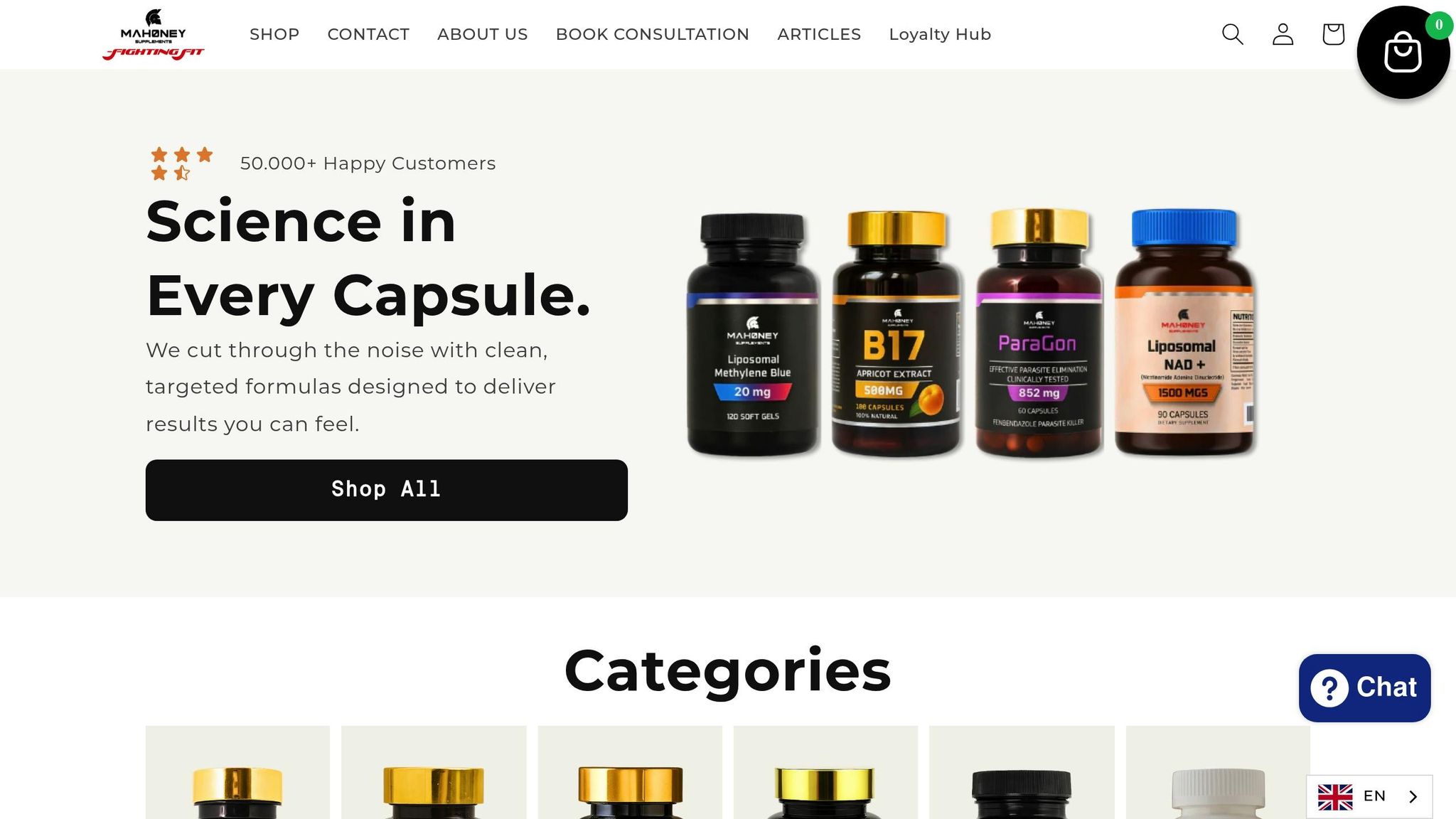
Milk Thistle for Fatty Liver: What Studies Show
Share
Milk thistle, a plant rich in the compound silymarin, has been studied for its potential to support liver health, particularly in managing non-alcoholic fatty liver disease (NAFLD). NAFLD affects about 25% of U.S. adults, often linked to obesity and poor diet. Silymarin may help by:
- Reducing liver inflammation and oxidative stress.
- Supporting cell repair and liver regeneration.
- Lowering liver enzyme levels (AST, ALT), markers of liver damage.
- Improving insulin sensitivity and cholesterol profiles.
While research suggests milk thistle can aid liver health, it works best with lifestyle changes like weight loss, a balanced diet, and regular exercise. Consult a healthcare provider before use, especially if you take medications or have advanced liver conditions. Side effects are generally mild but may include stomach upset or allergic reactions.
Milk thistle isn't a cure-all, but when combined with healthy habits, it may support long-term liver function.
How Milk Thistle Supports Liver Function
Antioxidant and Anti-Inflammatory Effects
Your liver works tirelessly, processing toxins and metabolic byproducts that generate free radicals - those unstable molecules that can wreak havoc on healthy liver cells. For individuals with NAFLD (non-alcoholic fatty liver disease), the oxidative stress caused by these free radicals becomes even more intense, leading to a damaging cycle of inflammation and cell injury.
This is where silymarin, the active compound in milk thistle, steps in. It helps break this harmful cycle by neutralizing free radicals and boosting glutathione levels, which restore balance between oxidative stress and the liver’s natural defenses.
Milk thistle also calms inflammation at the cellular level by blocking inflammatory pathways that contribute to liver damage. Persistent inflammation in fatty liver disease can escalate from simple fat buildup to a more severe condition called non-alcoholic steatohepatitis (NASH). By lowering inflammatory markers, silymarin not only helps to halt this progression but also creates the conditions needed for liver cells to recover and heal.
This antioxidant and anti-inflammatory support lays the foundation for improved liver cell repair and regeneration.
Cell Regeneration and Tissue Repair
The liver has an extraordinary ability to regenerate damaged tissue, and silymarin plays a key role in enhancing this natural process. It boosts liver repair by stimulating protein synthesis and protecting ribosomal RNA, ensuring that cells recover efficiently.
Silymarin also strengthens liver cell membranes, which are vital for proper liver function. These membranes act as barriers, controlling what enters and exits each cell. When toxins or oxidative stress damage these barriers, liver cells lose their ability to function effectively. Silymarin reinforces these cellular defenses, making liver cells more resilient to damage from fatty deposits and inflammatory substances.
In addition to immediate cell repair, milk thistle helps protect the liver from long-term damage by reducing scarring.
Reducing Liver Fibrosis
Liver fibrosis occurs when the liver tries to repair itself by forming scar tissue. Unfortunately, excessive scarring can disrupt liver function and may eventually lead to cirrhosis. In NAFLD, chronic inflammation and oxidative stress activate stellate cells, which produce collagen and other proteins that form this scar tissue.
Silymarin helps by reducing stellate cell activation and encouraging collagen breakdown. This improves liver structure, enhances blood flow, and minimizes scarring over time.
Unlike the quicker antioxidant effects, the process of reducing fibrosis takes longer and requires consistent use of milk thistle. This gradual improvement reflects the liver’s natural pace of healing, offering hope for better long-term liver health.
Clinical Studies: What Research Shows
Recent research builds on milk thistle's biological actions, offering insight into its clinical benefits.
Impact on Liver Enzymes
Studies show that silymarin can lower elevated liver enzymes like ALT and AST in patients with NAFLD. These enzymes typically rise when liver cells are damaged, signaling inflammation and cellular stress. By reducing these levels, silymarin appears to help alleviate liver inflammation and damage - an essential step in addressing broader liver health issues.
Effects on Insulin Resistance and Lipid Profiles
NAFLD often comes with metabolic challenges, such as insulin resistance and poor cholesterol levels. Research suggests that silymarin helps improve insulin sensitivity and supports healthier lipid profiles. These improvements may interrupt the harmful cycle between insulin resistance and fatty liver disease. While promising, more studies are needed to fully understand the extent of these effects.
Silymarin vs Standard Treatments
When compared to conventional NAFLD treatments, studies suggest that silymarin performs just as well in improving liver enzyme levels, with fewer side effects. Additionally, combining silymarin with dietary adjustments and other healthy lifestyle habits seems to amplify its liver-protective properties. This integrated approach offers a promising strategy for managing NAFLD more effectively.
Safety and Considerations for Milk Thistle Use
While studies suggest milk thistle may help manage fatty liver disease, understanding its safety and limitations is crucial before adding it to your routine.
Safety Profile and Common Side Effects
Milk thistle is widely considered safe, with most people tolerating it well. Serious side effects are rare, and the herb has a long history of use in traditional medicine, backed by modern research.
Some people may experience mild gastrointestinal issues like stomach upset, nausea, diarrhea, or bloating, especially during the first few days of use. These symptoms often fade as the body adjusts to the supplement.
If you’re allergic to plants in the Asteraceae family - like ragweed, chrysanthemums, or daisies - you should watch for potential allergic reactions. These might include skin rashes, itching, or breathing difficulties. Anyone with known plant allergies should be cautious when starting milk thistle.
It’s also worth noting that silymarin, the active compound in milk thistle, may affect how certain medications work. This includes blood thinners, diabetes medications, and psychiatric drugs, potentially altering their effectiveness.
Research Limitations
Although the research on milk thistle is promising, there are still key gaps that make it difficult to draw definitive conclusions.
Most studies on non-alcoholic fatty liver disease (NAFLD) have been small, often involving fewer than 200 participants. Larger studies with more participants are needed to better understand its effectiveness.
The short duration of many studies is another issue. Clinical trials often last just 12 to 24 weeks, which may not be long enough to capture the full effects of milk thistle on a condition like NAFLD, which develops over years. Whether the benefits persist with long-term use remains unclear.
Dosage inconsistencies also complicate the research. Studies have tested silymarin doses ranging from 140 mg to 700 mg daily, making it hard to pinpoint the ideal amount for liver health. Differences in extraction methods and silymarin concentrations in supplements further add to the confusion.
Finally, the quality of studies varies. While some are well-designed with proper controls and randomization, others lack these rigorous standards. This inconsistency highlights the need for more reliable research to confirm milk thistle’s benefits.
Consulting Healthcare Professionals
Before starting milk thistle, it’s important to consult a healthcare provider, especially if you have an existing liver condition or take prescription medications.
For those with advanced liver diseases like cirrhosis or hepatitis, professional guidance is essential. While milk thistle may support liver health, these conditions require specialized medical care, and adding a supplement could interfere with your treatment plan.
If you’re taking medications processed by the liver, your doctor can evaluate whether milk thistle might impact their absorption or effectiveness. This is particularly crucial for drugs with narrow therapeutic margins.
People with diabetes should also discuss milk thistle with their provider, as it may affect blood sugar levels. Your doctor might recommend closer monitoring or adjustments to your diabetes medications.
For pregnant or breastfeeding individuals, the safety of milk thistle remains unclear due to limited data. A healthcare provider can help weigh the potential benefits against the unknown risks.
Finally, consider working with your doctor to establish baseline liver function tests. This can help you track measurable improvements over time and ensure a more personalized approach to your health.
sbb-itb-9616115
Adding Milk Thistle to Your Liver Health Plan
Milk thistle can be a helpful addition to your liver health strategy, but it works best when paired with lifestyle changes and other supportive supplements.
Pairing Milk Thistle with Lifestyle Adjustments
Milk thistle’s benefits shine when combined with targeted lifestyle improvements, particularly those addressing liver fat.
- Weight management: Losing just 5–10% of your body weight can significantly reduce liver fat and inflammation, making this a key step in managing fatty liver.
- Dietary changes: Cut back on refined sugars, especially fructose from sodas and processed foods, to reduce liver fat. A Mediterranean-style diet - rich in olive oil, fish, vegetables, and whole grains - has been shown to improve liver enzyme levels and reduce inflammation.
- Regular exercise: Physical activity boosts insulin sensitivity and helps lower liver fat. Both aerobic and resistance exercises are effective, with moderate activity (about 150 minutes per week) showing measurable benefits, even without major weight loss.
- Limiting alcohol: Reducing alcohol intake is crucial since even moderate drinking can worsen liver inflammation and slow down healing - areas milk thistle aims to support.
Mahoney Supplements' Liver Health Solution

Mahoney Supplements takes a comprehensive approach to liver health with their TUDCA & NAC supplement, designed to complement milk thistle. At $92.00, this supplement supports detoxification, promotes bile flow, reduces cellular stress, and increases glutathione production - a key antioxidant for liver health.
- NAC (N-Acetylcysteine): NAC helps replenish glutathione, which is often depleted in individuals with fatty liver disease. This antioxidant is essential for protecting the liver from oxidative damage.
- TUDCA (Tauroursodeoxycholic Acid): TUDCA aids bile flow and supports liver detox pathways, making it a valuable partner to milk thistle in promoting liver recovery.
Together, milk thistle and TUDCA & NAC cover both short-term detox needs and long-term liver protection, offering a balanced approach to liver care.
Establishing a Routine for Lasting Results
Consistency is key when it comes to liver health. Milk thistle works gradually, often requiring months to show noticeable improvements, so patience is essential.
- Take milk thistle with meals: This helps maintain stable levels of silymarin (its active compound) and minimizes stomach discomfort.
- Monitor progress: Check liver enzymes every 3–6 months to track improvements in liver function and symptoms like fatigue or digestive issues.
- Stick to a schedule: Use phone reminders or pair supplementation with daily habits to ensure consistency.
Conclusion: Key Takeaways on Milk Thistle for Fatty Liver
Based on the clinical evidence and biological effects discussed earlier, here’s what you should know about using milk thistle as part of a liver health plan.
Research suggests that milk thistle, particularly its active compound silymarin, may offer benefits for fatty liver disease. With its antioxidant, anti-inflammatory, and antifibrotic properties, it can support liver function. However, it's not a standalone solution. Its effectiveness greatly improves when combined with lifestyle changes like healthy eating, regular exercise, and weight management. Without addressing underlying habits, milk thistle alone won't prevent liver issues.
For those managing NAFLD (non-alcoholic fatty liver disease), milk thistle works best as a complementary approach alongside proven lifestyle modifications. Some individuals also find additional support by combining it with supplements like TUDCA or NAC, but these should be considered carefully.
Before adding milk thistle to your routine, it’s important to consult with a healthcare provider. Registered dietitian Sue-Ellen Anderson-Haynes emphasizes caution for individuals with certain allergies:
"People with an allergy to the aster family, which includes common thistle, kiwi, and artichokes, should avoid milk thistle."
Additionally, milk thistle may interact with medications, so professional guidance is key to ensuring it’s safe and suitable for your specific health needs.
Consistency is crucial. Whether using milk thistle on its own or alongside other supplements, pairing it with lifestyle changes is the best way to support long-term liver health.
FAQs
Can milk thistle help treat non-alcoholic fatty liver disease (NAFLD)?
Milk thistle, especially its key component silymarin, has been linked to potential benefits for liver health, particularly for those dealing with non-alcoholic fatty liver disease (NAFLD). Research indicates that it may help improve liver enzyme levels, reduce fat accumulation in the liver, and aid in energy metabolism. That said, its effectiveness is not consistent across studies and falls short of the reliability of standard medical treatments.
This supplement works best as an add-on to established therapies, such as maintaining a balanced diet, staying active, managing weight, and following prescribed medications. It’s important to note that milk thistle should never replace these primary treatments but might enhance their effects when used together. Always check with your healthcare provider before adding any new supplement to your routine.
What lifestyle changes can enhance the benefits of milk thistle for liver health?
To get the most out of milk thistle for supporting liver health, it’s important to pair it with a well-rounded lifestyle. Start with a healthy diet that limits saturated fats, refined sugars, and processed foods. Adding regular exercise, such as brisk walking or light workouts, can also play a role in enhancing liver function. If you’re managing non-alcoholic fatty liver disease, even a modest weight loss of 5–10% of your body weight can lead to noticeable reductions in liver fat and inflammation.
It’s also crucial to avoid alcohol and drink plenty of water to ease the burden on your liver. By combining these habits with milk thistle supplementation, you can promote a healthier liver and improve your overall quality of life.
What should people with liver conditions know before using milk thistle?
If you’re dealing with a liver condition, it’s crucial to talk to your healthcare provider before trying milk thistle. Research indicates it might offer benefits for liver health, but its impact can differ based on your specific condition and its severity. Plus, milk thistle could interact with certain medications or pre-existing health issues.
Those with severe liver disease, hepatitis, hormone-sensitive conditions, or diabetes should be particularly careful. Milk thistle has the potential to influence blood sugar levels and hormone-related conditions, making professional advice key to using it safely.
